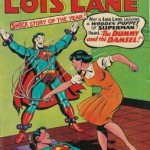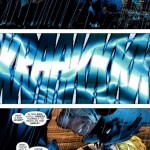One of my two favorite comics writers, Grant Morrison on the idea of making DC Comics’ Wonder Woman as big a deal as she ought to be. From io9.com:
So, Wonder Woman is a character where you imagine this very strange mélange of girl power, bondage, and a slightly disturbed sexuality. There is this bondage element; these extremely weird dark elements of Wonder Woman haven’t been adequately dealt with. Wonder Woman remains a really bizarre, untouchable character. She should represent women in the same way Superman represents men.
…
To make it work, to give [Wonder Woman] a sexuality that isn’t exploitive, because that’s too easy; but also to give her a [narrative] power.
William Moulton Marston, the character’s creator, was an odd combination of utopian feminist idealism and fetishistic sexuality. It’s important to remember that the character was never purely anything. From the beginning Wonder Woman was (always, already) schizoid, multi-valent: one part patriotic symbol, one part feminist ideal, one part lesbian icon, one part dominatrix, one part sex toy, and probably a few other parts beyond that. It’s hard to make a character with so many diverse elements work, though when it does it can be very satisfying. (Xena: Warrior Princess had a similar mosaic of progressive messages, comedy, kung fu, sword and sorcery, cheesecake/beefcake and lesbian subtext.)
From a writer’s perspective, there’s an additional problem in introducing the character to a larger audience. The other well-known superheroes start out as people in a world that resembles our own. Superman was a mid-western farm kid, Batman was a East Coast old money scion, Spider-man was a working-class nerd. When writing the character, you can start with a person who has grown up in an environment the viewer can relate to, and then add the fantastic elements. Wonder Woman, however, comes from a fantastic island of Amazon women, and in some versions of her origin she was made out of clay and given life. She doesn’t come to our world until she is an adult.
I think it could be done. “Hellboy” for example, features a hero who can’t pass for human, and his challenge is to retain his loyalty to humanity. The story introduces him to the view through the eyes of a more relatable human character.



